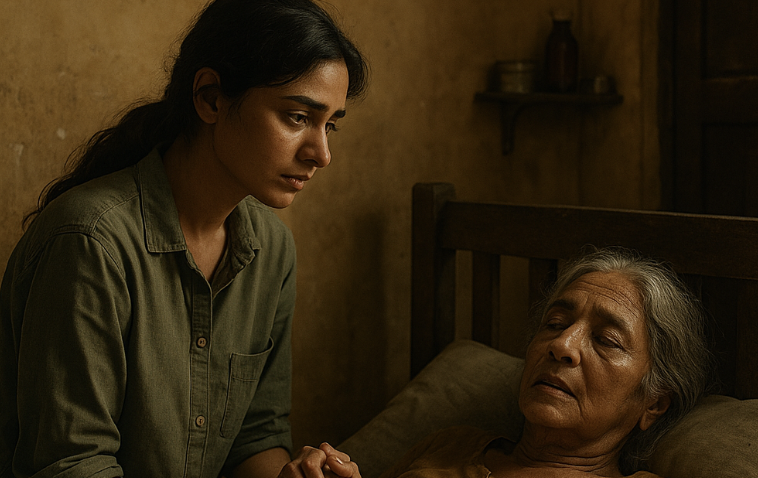When her husband walked out, Priya was only twenty-five.
He said he was leaving for work overseas—and then vanished from her life as if he’d stepped off the edge of the earth.
Priya cried until her ribs ached. Even so, with swollen eyes and hands that wouldn’t stop trembling, she stood by the stove and stirred porridge for her mother-in-law.
Madam Amma had suffered a stroke. She lay completely bedridden, every small need tethered to Priya’s constancy.
“Go home to your own people,” the neighbors urged. “You’re still young. Start again.”
Priya only answered with a soft, unshakeable smile.
From the first day of the wedding, Amma had folded Priya into the family like a true daughter. Once, when Priya herself fell dangerously ill, it was Amma who kept vigil through the night—measuring out pills, refreshing the warm water by the bed, smoothing Priya’s hair when fear made her shiver. And whenever Priya felt splintered or adrift, Amma took her hand and whispered, “I am here, my child. Always.”
So Priya stayed.
Day after day became a liturgy of care: cooking, sweeping, washing, helping with the slow grind of rehabilitation, bringing spoonful after spoonful to Amma’s lips.
On cold days, when Amma’s body shook with tiny, stubborn tremors, Priya warmed oil between her palms and massaged each limb until the old woman slept, wrapped and quiet as a candle flame.
Even when exhaustion pinned her shoulders, Priya made Amma’s favorite porridge and fed her gently, patient as rainfall.
Amma would watch her with eyes bright and wordless—a gratitude too large for language.
Twenty years went like breath on glass.
Silver threaded itself through Priya’s hair.
Neighbors lowered their voices as she passed. “Who else has a heart like that?” they murmured, half awe, half prayer.
A few men tried to court her. Priya only shook her head.
“As long as Amma lives, I will not go,” she said, and meant it.
Then came the season when Amma began to fade.
She beckoned Priya close, folded her trembling fingers around the younger woman’s hand, and whispered, “Thank you, my child. There is something I never told you.”
Priya leaned in until she could hear the delicate rasp of Amma’s breath.
“The day your husband demanded a divorce,” Amma said, “he brought the papers to me. He wanted my signature. I refused. He left in a fury.” A pause, a swallow. “A few years later he had an accident. He died. They sent his ashes from abroad. I kept them beneath the altar.”
Priya’s heart cinched tight—but the well of her tears had long since run dry.
Amma went on, softer still. “In the cupboard there’s a deed to the land. It is in your name. I never had daughters, but you have always been mine.”
Amma died as she had lived with Priya—quietly, with dignity. Peacefully.
The entire village came to the funeral. People who had only known Amma by her porch light and her blessing stood shoulder to shoulder, weeping openly as Priya knelt by the coffin, a grief rising out of her like tidewater.
A few days later, Priya opened the cupboard.
There lay the land deed with her name written clear as morning. Beside it, a small savings book—figures neatly added across years: a sum of more than two million rupees.
Amma had been setting money aside in secret: renting out the back plot, selling a strip of vegetable garden, peeling a little from her pension and tucking it into Priya’s future. Every entry, every deposit, carried Priya’s name.
On the first anniversary of Amma’s passing, Priya painted the house, mended the fence, replaced the cracked tiles. Then she set up a small stall in the courtyard and hung a hand-painted sign:
Amma’s Oat House.
People paid what they could. Some could not pay at all.
“Charge more,” customers urged her. “You’re too kind.”
Priya would smile the same quiet smile she had given the neighbors years ago.
“Amma lived because of the oatmeal I made,” she said. “Now I live by selling it—and by helping where I can. That is more than enough.”
That afternoon the courtyard hummed—voices, clinking bowls, the soft steam of comfort rising into the air.
In one corner, an old woman sat huddled against the breeze, hands cupped around a bowl of hot porridge. She ate slowly, as if relearning warmth.
She looked up. “My child,” she said, “this porridge is delicious. It warms the soul.”
Priya’s eyes blurred. Amma’s face—laughing, stern, tender—rushed back like sunlight. She leaned closer, her voice barely above a breath.
“Madam,” she said, “I made it with all the love that was once given to me.”



